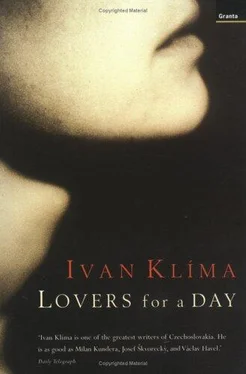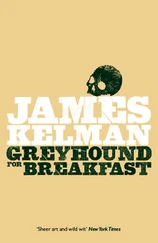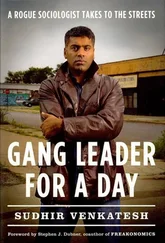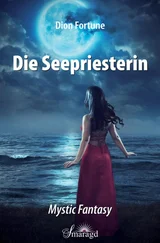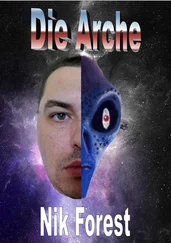'Darling, you may not even be aware of it, but you really are jealous!'
'I'm not. I just don't intend to be made a total fool of.'
'No, your assistant's the fool.'
'Why didn't you tell me about this Vašek?'
'You didn't ask.'
'How could I ask when you didn't tell me you just happened to bump into him?'
'Why the stress on the words "bump into"?'
'It's just that it really does strike me as an extraordinary coincidence that you should bump into a college friend from Kolín at the bottom of Wenceslas Square at half past ten on a Monday morning.'
'Your assistant may be a fool, but he has a good idea of the time.'
'My assistant isn't such a fool. Maybe I'm a bigger one. How come you were at the bottom of Wenceslas Square at that time?'
'On Mondays I have a free period from ten to twelve. I thought you knew my timetable.'
'You've never felt the need to communicate it to me.'
'I don't expect you were interested. Besides, it's always changing.'
'Besides which it suits you that I don't know your free periods. But you haven't told me yet why you never mentioned him to me.'
'I suppose that evening as usual you didn't have time to talk. And anyway it never occurred to me you'd be interested in any of my old college friends.'
'What interests me is who you spend your time with. That's quite normal, I would have thought.'
'You mustn't be jealous, darling. You know you're the only one I have. Because I for one know I'd never find another man like you in the whole wide world.'
'You're drunk.'
'After three glasses of wine? You underestimate me!'
'The only thing I underestimate is your ability to count how many glasses of wine you have actually drunk. Are you going to tell me something about this college chum of yours?'
'We met. He asked me how I was.'
'You didn't ask him?'
'Yes.'
'So what's he doing?'
'What do you mean, what's he doing? He's got a wife and two children. And he works in television. If that's what you mean.'
'Did you go and find somewhere to sit?'
'You didn't expect us to stand on the corner in that heat, did you?'
'And he wasn't with you today?'
'Today I was with Olga.'
'So you say.'
'Are you saying I'm lying?'
'I didn't say anything of the sort.'
'No, you only hinted at it. You just don't believe me. You should give your assistant a good ticking-off for failing to follow me closely enough. Or maybe hire an agency. It's possible these days. You pay them and they can snoop out who I was sitting in the wine bar with. You're disgusting!'
'So I'm disgusting, am I? You come home at night drunk and I'm the disgusting one.'
'I didn't,come home at night and I'm more sober after a bottle of wine than you are after two glasses of lemonade.'
'Who's the dark-haired guy? Surely you can say a couple of normal sentences to me?'
'He's a fellow student from Kolín. We bumped into each other at the bottom of Wenceslas Square. I had an hour free and we went and sat somewhere. What interests you is if we made a date. No, we didn't. But he gave me his telephone number. Do you want it?'
'No, but I'm getting tired of your evasions.'
'I'm the one doing the evading? I toil for hours at school and then rush home here in a sweat in order to look after you lot. Then, out of the kindness of your heart, you offer me a week off and after five days you interrogate me as if I was your slave.'
'You're far from being a slave, very far. But you still haven't answered me.'
'And I don't intend to, because I find both your tone and this whole interrogation insulting.'
'Okay. Well, I find the situation you're placing me in degrading.'
'I'm placing you in some kind of situation?'
'Yes. Even my assistant has already. .'
'God in heaven, why do I have to keep hearing about that fool?'
'It's me who's the fool, not him, for putting up with this.'
'So don't put up with it then. Just leave me alone.'
'What's that supposed to mean, "don't put up with it"?'
'Seeing as I don't know what you actually object to, I can't tell what it implies. What I do know is that you've spoiled my mood, and that I don't want to listen to you any more.'
'Now or ever again?'
'Now and preferably never again.'
'Fine. We can get a divorce.'
'Okay, then.'
'You can say it just like that?'
'It was you who said it, not me.'
'I said it because I know that's all you're waiting for.'
'Maybe it is, but it's you who said it. And besides, you'll never divorce me because you know full well you'd never find anyone else to put up with you, not even if you sent all your assistants out scouting.'
(1994)
URANUS IN THE HOUSE OF DEATH
Only very rarely is someone from Prague invited to Australia with their fare and expenses paid. Director Michal Vrba received an invitation to a theatre festival due to take place in the city of Adelaide during March. The festival was linked to all sorts of exhibitions, conferences and debates. To judge from the programme enclosed with the invitation, the distant seaport with the sweet maidenly name would be sagging under the weight of cultural events during the festival.
Michal tended to be a doer who regarded talk about theatre as a waste of time, since everything that could be said about theatre had already been written long ago. None the less the invitation pleased him — thrilled him in fact. He replied immediately, saying that he accepted the invitation to speak about Czech theatre and was looking forward to visiting the antipodes.
Regarding himself as a free agent (he had been divorced several years earlier) he could see nothing to prevent him taking the trip.
When he arrived that evening at Leona's (Leona s real name
was Alena, but from the moment she became his lover he had called her Leona; it sounded more arty) he told her about his trip with almost excessive enthusiasm. He exaggerated because he was unsure how she would react to the news and he wanted to make it clear that he was going whether she liked it or not.
'And they didn't invite me?' she wanted to know.
'I don't think they even invited wives.'
Leona acted in the small theatre where he was the sole director, as well as administrator, manager, and, most of the time, author of the plays (or rather poetical compilations.) He had trained as an economist, however, and defected to the theatre because economics bored him. But his knowledge came in handy as he had some inkling at least about market forces. He found Leona attractive — she was tall and slender with small breasts and a soft voice — and she was alluringly eccentric. Whenever she got drunk, which was quite often, she wanted to make love to him, no matter where they happened to be. Then she would demand, 'What have you done to me?' And she would expect him to reply in the most direct terms. Apart from that she was interested in all sorts of magic. She made regular visits to an astrologer and consulted fortune-tellers and homoeopaths. Michal didn't believe in any of that stuff, but so long as she brought him indisputable predictions about the good prospects of their relationship, or possible dangers for their theatre, or potential economic opportunities, he accepted it as part of their amatory conversations. He had therefore already provided her with the precise details about the moment when he left his mother's womb, and from time to time even allowed her to tell his fortune from the cards, which almost always foretold love and stressed with surprising frequency his artistic proclivities.
'Last time my tarot-reader talked about a long journey,' she now recalled. 'I thought she was talking about me, but now I see she meant both of us.'
Читать дальше
